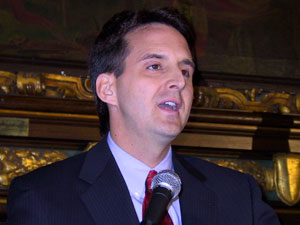Audio
Photos
Your Voice
| ||||||||||||||||||||||||||||||||||||||||||||||||||
Pawlenty's 100 days: The question is what's ahead?
April 27, 2003
 |
| Pawlenty has long been a proponent of smaller government, and says his budget does have a vision. "It's, how 'bout live within your means?" he jokes. (MPR Photo/Laura McCallum) |
St. Paul, Minn. — Gov. Pawlenty says his first few months on the job have been overshadowed by the state's massive budget crisis. Pawlenty's budget would erase the largest deficit in Minnesota history with a combination of spending cuts, one-time money and accounting shifts. The suburban Republican says four years from now, he hopes to be able to say he solved the state's largest budget crisis.
"But then beyond that, we don't want to just be mired down in a crisis; we want to move the state forward in a number of strategic areas," Pawlenty told Minnesota Public Radio. "So you will see us, as we already have, propose reforms in education and in transportation and in health care and welfare. And so I think Minnesota will look a lot like it looks now, but better."
Pawlenty wants to replace the state's Profile of Learning graduation standards with a back-to-basics approach, and borrow for about $1 billion in road projects.
|
We'll be a lower-tax state, we'll feel good about that, but I think we will be disgruntled that we've become a lower-service state, the quality of life has deteriorated some relative to other states and I think we'll have another round of conversations then about how Minnesota used to be an innovator, Minnesota used to be one of those admired states and we are no longer.
- Michael O'Keefe |
He created a task force to try to tackle rising health care costs, and proposed stricter welfare-to-work standards.
But some budget experts say there's little long-term vision in Pawlenty's budget. Jay Kiedrowski, a business executive who served as finance commissioner under DFL Gov. Rudy Perpich in the mid-'80s, says a governor needs a strategy in times of fiscal crisis.
"And this budget, in my opinion, lacked any form of strategy or vision. It was simply, we have to cut because we can't increase taxes," according to Kiedrowski.
Kiedrowski says Pawlenty's predecessors had a long-term budget strategy. He says Perpich tried to restart the economy and create jobs in a time of deficit,
Republican Gov. Arne Carlson sought to restore fiscal stability after the state had lost its AAA bond rating, and Gov. Jesse Ventura had a "Big Plan."
Pawlenty has long been a proponent of smaller government, and says his budget does have a vision.
"It's, how 'bout live within your means?" he jokes.
"That's the first principle. And before we can get to grandiose visions about rebuilding Minnesota, we have to first solve the largest budget crisis in the history of the state, which is $4.5 billion in debt. And so the vision isn't fancy, the vision is learn to live within your means," according to Pawlenty.
Critics say Pawlenty's vision focuses too much on the no-tax-increase pledge he signed during the campaign. Former Human Services Commissioner Michael O'Keefe says Pawlenty's budget would move the state backward in many areas.
O'Keefe, who served under Gov. Ventura, says Pawlenty's proposed cuts would reverse the progress Minnesota has made in insuring nearly all of the state's children, and put a halt to the development of light rail and other forms of mass transit.
He says under Pawlenty's watch, Minnesota would become a lower-cost, lower-service state. "My prediction would be, we'll be a lower-tax state, we'll feel good about that, but I think we will be disgruntled that we've become a lower-service state, the quality of life has deteriorated some relative to other states and I think we'll have another round of conversations then about how Minnesota used to be an innovator, Minnesota used to be one of those admired states and we are no longer, how do we regain that."
Pawlenty supporters say the governor is taking advantage of the state's fiscal crisis to find better ways of funding health care, education, transportation and other areas.
Former U.S. Sen. Dave Durenberger, who's heading the governor's health care task force, says Pawlenty is telling Minnesotans not to simply rely on government to solve problems. He says at the end of Pawlenty's term, the state could resemble the Minnesota of the 1970s.
"Because then, Minnesotans took responsibility for changing the way we do business as a state. And we were creative and we created new economic and sort of entrepreneurial approaches and we also created more entrepreneurial government approaches at that stage of our growth," according to Durenberger.
Pawlenty says Minnesota can slow down the growth in government spending without jeopardizing the quality of life. His critics say if Pawlenty's wrong, it's going to be much more difficult to rebuild the programs Pawlenty would cut in his budget.
|
News Headlines
|
Related Subjects
|

